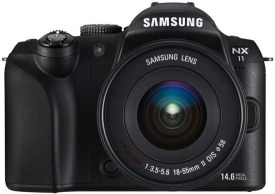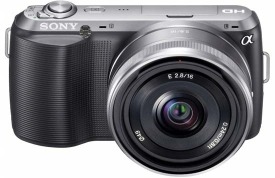TOPIC: NX-11
Dispensing with temptation as new cameras keep getting launched
26th January 2012Many manufacturers followed Olympus into the compact system camera market. Nikon joined late last year, though Canon hasn't yet entered. Olympus E-PL1 kits with 14-42mm zoom lenses tempted me at around £250. After researching competitors, my shortlist included the Samsung NX-11, Sony NEX-C3, and its higher-end model, the NEX-5N.

What eventually countered the allure of shiny objects was the question as to why I needed such an item. After all, I already possess a Pentax K10D DSLR and a Canon PowerShot G11, and these have been satisfying my photographic needs for a while now. While the DSLR may date from 2007, it is still working well for me and, if it ever needed replacing, I'd be going for another Pentax with the K-5 being a strong contender. The Canon is doing what's asked of it, so the recent launching of the G1 X isn't so tempting either.
The whole dalliance has me wondering about how photographic equipment changeovers come about. After all, it was around a decade ago with the DSLR revolution was in the offing if not in progress. Until then, film photography was predominant, but it looks as if it got as far as it could from a technological point of view when I look back at what happened. The digital photography area was new and untapped, so moving there offered new possibilities and purchases more easily justified. The result is that very few film cameras are being made nowadays. Ironically, it's film photography that now is untrammelled terrain for many, and it is holding its own too in an era when digital photography predominates.
The same sort of newness that came with digital photography also applies to CSC's to a certain extent. From the heritage of half-frame 35 mm film photography, Olympus has fashioned a different type of digital camera: essentially a compact with interchangeable lenses. Was it the fact that I have no CSC that caused me to be tempted, and has it happened to others too? Also, is that what got digital photography going in the first place?
It almost feels as if camera manufacturers have to keep bringing to market new models and new types of camera to stay in business. After all, Minolta had to sell its camera division to Sony when they failed to get going in the DSLR market quickly enough. The same thing might have happened to Pentax too, with the marque passing to first to Hoya, and then to Ricoh after the firm lost its independence.
What doesn't help is the lack of longevity of camera models. The coming of digital photography has exacerbated this situation, with models being launched at a frenetic rate. In the days of film photography, a model could last on the market for a few years and there was once a time when a twenty-year lifetime wouldn't have looked so ridiculous, though there were incremental improvements made over that time too. For instance, a Pentax K1000 wouldn't be the same at the end of its production run as it was at the start, though the model number may be the same. That world is gone.
SLR design has endured for about 50 years, but mirrorless technology now presents unprecedented competition. Even compact cameras offer live through-the-lens viewing. Olympus revived its film heritage by creating the E-P1 with interchangeable lenses. These descendants of the original half-frame 35mm PEN cameras appropriately use smaller micro four thirds sensors. Sony has developed translucent mirror technology that eliminates moving parts found in traditional SLRs. Canon experimented with this in the 1980's with film cameras but abandoned it. Meanwhile, Samsung and Panasonic produce mirrorless SLR-style cameras with live viewing and electronic viewfinders, suggesting full-size equivalents may be coming. Olympus's current teaser campaign has sparked speculation about a possible OM-D release.

In parallel with all this, Sony is making a good impression with their CSC's, the NEX series. These have APS-C sized sensors like many DSLR's and in compact bodies as well. However, the feel very much is that of a compact camera and some have complained of a like of buttons on them, even if the photographic quality is excellent. Samsung have gone for the same sensor size in their NX-11, while they have gone for SLR styling. That may be more suitable for some than having to find settings buried in menus.
We're living in an exciting yet unsettling period of camera technology evolution. Cameras are becoming smaller, and traditional still cameras now shoot videos too, though filmmaking remains a time-intensive hobby that doesn't interest me. Recent legal developments complicate original work, as shown by a successful copyright case based on Photoshop image processing. With countless images being created daily and potential changes allowing intellectual property claims in small claims courts, avoiding infringement becomes harder. Film photography seems appealing in contrast and remains viable despite Kodak's financial struggles. As tastes shift and film becomes novel again, the future is uncertain. Perhaps investing in a DSLR body makes sense before Compact System Cameras completely replace them. Camera technology has become interesting once more.